#-primary science tuition
Explore tagged Tumblr posts
Text
The Skills Honed in Preschool to PSLE Science Tuition in Singapore
A learner's academic journey is typically linear, with the common formula of preschool learning, proceeding to primary school, moving to secondary education, and immediately taking a mind-gruelling examination. However, these stages are not just to separate levels, they are also designed to develop specific skills necessary for achieving success.
With that, explore the unique skills nurtured in preschool enrichment classes, primary science tuition, secondary science tuition, and PSLE science tuition in Singapore.

Preschool Enrichment Classes: Building a Strong Foundation
Preschool enrichment classes foster foundational skills necessary for a child's overall development. These classes offer a stimulating environment where young learners engage in activities to enhance their cognitive, social, and emotional abilities. Through interactive games, creative arts, and sensory experiences, children develop essential skills such as problem-solving, communication, and teamwork. Moreover, exposure to early literacy and numeracy concepts lays the groundwork for future academic success.
Core Skills Developed in Preschool Enrichment Classes:
Social Interaction: Encourages children to interact with peers, fostering social skills like sharing and cooperation.
Language Development: Introduces vocabulary and language structures through storytelling and rhymes, promoting communication skills.
Critical Thinking: Stimulates curiosity and exploration, nurturing problem-solving abilities and logical reasoning.
Fine Motor Skills: Activities like drawing and cutting aid in developing hand-eye coordination and fine motor skills.
Primary Science Tuition: Cultivating Scientific Inquiry
Primary science tuition aims to instil a love for science and cultivate critical thinking skills from a young age. These classes complement the school curriculum by providing in-depth explanations, hands-on experiments, and interactive discussions. Students are encouraged to ask questions, make predictions, and analyse data, fostering a deeper understanding of scientific concepts. Moreover, primary science tuition fosters curiosity and encourages students to explore the world around them, laying a solid foundation for future scientific pursuits.
Core Skills Developed in Primary Science Tuition:
Scientific Inquiry: Encourages students to ask questions, make observations, and draw conclusions based on evidence, promoting scientific inquiry skills.
Analytical Thinking: Challenges students to analyse data and identify patterns, enhancing critical thinking abilities.
Communication: Engages students in discussions and presentations, honing their ability to articulate ideas and findings effectively.
Experimental Skills: Provides opportunities for hands-on experiments, allowing students to develop practical laboratory skills and techniques.

PSLE Science Tuition: Excelling in National Examinations
PSLE science tuition programs are tailored to prepare students for the Primary School Leaving Examination (PSLE), a critical milestone in their academic journey. These programs focus on intensive revision, exam strategies, and targeted practice to ensure students are well-prepared for the national examination. PSLE science tuition covers all topics tested in the PSLE science syllabus, providing comprehensive coverage and thorough preparation. Additionally, these programs offer mock exams and continuous assessments to track students' progress and identify areas for improvement.
Core Skills Developed in PSLE Science Tuition:
Content Mastery: Ensures students thoroughly understand all topics covered in the PSLE science syllabus, enhancing content mastery.
Exam Readiness: Equips students with exam-taking strategies and techniques to maximise performance under exam conditions.
Time Management: Provides practice in time-bound assessments, helping students learn to manage their time effectively during examinations.
Confidence Building: Offers personalised support and feedback to boost students' confidence and alleviate exam-related stress.
Secondary Science Tuition: Preparing for Advanced Studies
Secondary science tuition in Singapore caters to students preparing for more advanced levels of scientific study. These classes journey deeper into complex scientific theories and principles, preparing students for the rigours of higher education. With a focus on examination preparation, secondary science tuition equips students with the knowledge and skills needed to excel in their secondary school examinations. Additionally, these programs often offer personalised attention and targeted support to address individual learning needs and challenges.
Core Skills Developed in Secondary Science Tuition:
In-depth Understanding: Explores advanced scientific concepts in greater detail, fostering a deeper understanding of complex theories.
Exam Techniques: Provides strategies and practice exercises to enhance exam-taking skills, improving assessment performance.
Independent Learning: Encourages students to take ownership of their learning and pursue independent research, fostering self-directed learning skills.
Problem-solving: Presents challenging problems and real-world applications, enhancing problem-solving abilities and analytical thinking skills.
Conclusion
The academic landscape of Singapore is booming with different stages and options designed to meet the needs of students at various points in their educational journey. These programs, from preschool, primary, and secondary to PSLE science tuition, provide specialised instruction for learners in Singapore to develop specific skills. Each program is necessary for fostering students' intellectual curiosity, critical thinking skills, and academic achievements, so skipping them is non-recommendable.
Visit Level Up Tuition, and allow us to help your child take the first step towards scientific success.
#preschool enrichment classes Singapore#-primary science tuition#psle science tuition singapore#secondary science tuition singapore#toa payoh tuition centre
0 notes
Text
Best Primary Science Tuition in Singapore | Learniverse.edu.sg
Unlock your child's potential with the best primary science tuition in Singapore. Our expert tutors offer interactive and stimulating lessons that make complex scientific concepts easy to grasp. We use a hands-on approach to foster a love for science and enhance critical thinking skills. Explore our science tuition programs and see how we can support your child's academic growth at Learniverse.
Best Primary Science Tuition in Singapore

0 notes
Text
A Complete Guide to Kiya Learning’s Science Exam Preparations in Singapore

Preparing for science exams can be a daunting task, but at Kiya Learning, we provide students with the tools, resources, and support they need to excel in Physics, Chemistry, and Biology across all levels, from Secondary School to Junior College. Our expert tutors, personalized programs, and strategic exam preparation approach ensure that students are confident and well-prepared for key exams such as the PSLE, O Levels, and Junior College exams.
The Importance of Science Exam Preparation
In Singapore’s highly competitive education system, scoring well in science subjects is crucial for academic success. Strong science foundations not only open doors to higher education but also provide essential skills for many future careers. However, mastering subjects like Physics, Chemistry, and Biology requires not only a deep understanding of the concepts but also strategic exam preparation to meet the specific demands of the Singaporean education system.
Key Features of Kiya Learning’s Science Exam Preparations
Comprehensive Coverage of Subjects:
Physics: From understanding basic mechanics to mastering electromagnetism and quantum theory, we cover all major topics required for O-Level and Junior College exams.
Chemistry: Our chemistry tuition focuses on core topics such as atomic structure, chemical bonding, stoichiometry, and organic chemistry.
Biology: Covering cell biology, genetics, human anatomy, and ecology, our biology lessons are designed to help students excel in both theory and application-based questions.
Tailored Exam Preparation for Different Levels:
PSLE Science Preparation: For Primary 6 students, our PSLE Science tuition focuses on building strong foundational knowledge, with an emphasis on problem-solving skills and conceptual understanding. We prepare students to handle both multiple-choice and open-ended questions, while familiarizing them with common PSLE question types.
O-Level Science Tuition: The O-Level curriculum can be challenging, but our tutors help students break down complex scientific concepts into manageable parts. We provide thorough exam preparation in Physics, Chemistry, and Biology, with special attention to practical skills, theoretical understanding, and the specific demands of the O-Level exam format.
Junior College Science (A-Level): Our Junior College programs for A-Levels focus on the higher-order thinking and problem-solving skills required to excel in Physics, Chemistry, and Biology. We help students tackle challenging A-Level content, including data analysis, practical exams, and long-form essay questions.
Exam Preparations: Patterns, Strategies, and Mock Tests
Understanding the Exam Pattern: Kiya Learning emphasizes the importance of knowing the structure of each exam. Our lessons are designed around the exam patterns, ensuring students are familiar with the format, timing, and types of questions they will encounter.
Multiple-Choice Questions (MCQs): We train students to approach MCQs strategically, ensuring they can eliminate wrong answers quickly and maximize their chances of scoring.
Structured and Open-Ended Questions: Whether it’s a long-form question in Physics or an experimental design question in Chemistry, we teach students how to structure their answers effectively, focusing on clarity, accuracy, and conciseness.
Strategic Revision and Practice:
Topic-Wise Revision: We provide targeted revision plans that focus on high-weightage topics while reinforcing weaker areas.
Mock Tests and Timed Practice: One of the best ways to prepare for science exams is through mock tests. At Kiya Learning, we offer full-length, timed mock exams that simulate the actual test experience. These tests help students build exam-day stamina and improve their time management skills.
Error Analysis: After each mock test, students receive detailed feedback and analysis of their mistakes. This helps them identify recurring errors and rectify them before the actual exam.
Key Benefits of Kiya Learning’s Science Tuition Programs
Experienced Tutors: Our tutors are highly qualified and have extensive experience preparing students for the PSLE, O Levels, and A Levels. They are well-versed in the syllabus and exam requirements, providing valuable insights and tips.
Customized Learning Plans: We recognize that each student has different learning needs. Our programs are tailored to address individual strengths and weaknesses, ensuring that each student receives personalized attention.
Interactive and Engaging Learning: We use innovative teaching methods, including virtual labs, interactive quizzes, and collaborative discussions, to make science engaging and understandable.
Stress-Free Learning Environment: We foster a supportive learning environment where students feel encouraged to ask questions and clarify doubts, helping them approach their exams with confidence and less stress.
Regular Assessments: Our frequent tests and quizzes ensure that students stay on track and make steady progress throughout their preparation.
Why Choose Kiya Learning for Science Exam Preparation?
Kiya Learning is committed to providing high-quality education that equips students with the skills they need to succeed in their exams. Our science tuition programs not only focus on covering the syllabus but also instill critical thinking, time management, and exam-taking strategies. With Kiya Learning, students are not just prepared for exams—they are prepared for success in life.
If you are looking for expert guidance in Physics, Chemistry, or Biology and want to ensure your child is well-prepared for their upcoming science exams, join Kiya Learning today! Let’s work together to achieve academic excellence.
CONTACT US -
Instagram - https://www.instagram.com/kiyalearning/ https://www.instagram.com/kiyalearningsingapore/
Website URL -
Business Email - [email protected]
Whataap Link - https://wa.me/message/SABJEJKZBD5IE1
#Best Science Tuition Singapore#Science Enrichment Classes Singapore#Primary Science Classes Singapore#Secondary Science Tuition Singapore#Science Olympiad Training Singapore#Science Curriculum in Singapore#Online Science Classes Singapore#STEM Education Singapore#Science Workshops for Kids Singapore#Science Tutors Singapore#Physics Classes Singapore#Chemistry Tuition Singapore#Biology Tuition Singapore#Hands-on Science Learning Singapore#Science Exam Preparation Singapore
0 notes
Text
PSLE Science: Demystifying the Exam and Unlocking Success with Tuition
The PSLE Science exam can feel like a looming storm cloud for many students. Understanding complex biological processes, mastering the intricacies of physics, and excelling in the practical component can all seem daunting. But fear not! PSLE Science tuition can be the guiding light that steers your child towards a successful and enriching learning journey.
Cracking the Code: Understanding the PSLE Science Exam
The PSLE Science exam assesses students' understanding of scientific concepts covered throughout their primary school years. It typically consists of two parts: a paper-based theory component and a practical component.
Theory Component: This section tests students' knowledge of core scientific concepts across various themes like living things, matter and materials, forces and energy, and Earth Science. The format may include multiple-choice questions, open-ended questions, and tasks requiring students to analyze data and draw conclusions.
Practical Component: This hands-on assessment evaluates students' ability to apply their scientific knowledge in a practical setting. Students might conduct experiments, record observations, and interpret data to solve problems or answer scientific questions.
Where PSLE Science Tuition Shines
PSLE Science tuition offers a multitude of benefits that can empower your child to excel in the exam and develop a love for science. Here's how tuition can make a difference:
Building a Strong Foundation: Qualified tutors can break down complex scientific concepts into manageable chunks, ensuring your child grasps fundamental principles. Through clear explanations, interactive activities, and engaging demonstrations, they solidify core knowledge in areas like cell structure, photosynthesis, or the properties of matter.
Going Beyond Rote Learning: Effective tuition goes beyond memorizing facts. Tutors employ engaging methods that promote critical thinking, problem-solving skills, and scientific inquiry. This might involve:
Interactive activities: Hands-on experiments, simulations, and group projects bring scientific concepts to life and make learning enjoyable.
Developing Research Skills: Tutors guide students in researching scientific topics, analyzing data, and drawing well-supported conclusions, fostering a sense of scientific curiosity.
Practice Makes Perfect: Regularly practicing past year PSLE papers and tackling challenging questions helps students develop exam technique, build confidence, and identify areas requiring further focus.
Personalized Support for Individual Needs: Every child learns at their own pace and has unique strengths and weaknesses. PSLE Science tuition caters to these individualities. Through personalized assessments, tutors can identify areas where your child needs extra support and create a learning plan tailored to address these specific needs. This ensures they progress comfortably and develop a well-rounded understanding of scientific principles.
Nurturing a Love for Science: The best PSLE Science tuition goes beyond exam preparation. It can ignite a passion for science and a thirst for knowledge. By fostering curiosity, encouraging exploration, and demonstrating the real-world applications of scientific concepts, tutors can spark a lifelong love of learning in your child.
Signs Your Child Might Benefit from PSLE Science Tuition:
Struggling with Core Concepts: Does your child find understanding scientific concepts challenging? Tuition provides targeted support to bridge knowledge gaps and ensure a strong foundation.
Lack of Confidence: Is your child hesitant to participate in science lessons or feels anxious about the PSLE Science exam? Tuition can build confidence and equip them with the skills to excel.
Needs Extra Support: Every child learns at their own pace. Tuition offers personalized attention to address specific areas of difficulty and ensure your child reaches their full potential.
Desire to Go Beyond: Does your child possess a natural curiosity about the world around them? Tuition can nurture this curiosity and provide a platform for deeper exploration of scientific concepts.
Investing in Your Child's Future:
PSLE Science tuition is an investment in your child's future. A strong foundation in science sets the stage for success in higher education and equips them with critical thinking and problem-solving skills valuable in any chosen field. Moreover, a love for science can open doors to exciting career paths and a lifetime of discovery.
Choosing the Right Tutor:
Look for a qualified PSLE Science tutor who possesses:
Strong understanding of the PSLE Science curriculum
Experience working with students preparing for the PSLE exam
Enthusiasm for science and a passion for teaching
Ability to tailor lessons to individual learning styles
Positive and encouraging teaching approach
The Journey to PSLE Science Success
By choosing PSLE Science tuition and actively participating in your child's learning journey, you're sending a powerful message. You're showing them that science is fascinating, that hard work is rewarded, and that you believe in their ability to succeed.
0 notes
Text
0 notes
Text
Tuition for primary school students in Heyes | Progress Learning Centre
Best Tuition for primary school students in Heyes, UK at Progress Learning Centre. Our expert educators provide personalized support to help young learners excel academically and build a strong educational foundation.

#english literature gcse#math tutor online#science tuition online#education care center#childcare and education#notes#learning tuition centrer#reading#Tuition for primary school students in heyes
0 notes
Text
https://www.88tuition.com/course/online-science-tuition/psle-primary-5-science-tuition
0 notes
Text
Turn a Boring Science Concept into a Fun-Learning Concept
0 notes
Text
Deutschribing Germany
Education
Education in Germany is free and compulsory between ages six and sixteen. States (Länder) are largely responsible for education, with the federal government playing a minor role.
Types of schools
The vast majority of children attend state schools, but there are private schools (Ersatzschulen) as well. The latter have very low tuition fees and are also subsidized by the state, which effectively makes them privately-run schools funded by the state. Some are run by religious groups.
School terms
The school year is divided into two terms (from August to January and from February to July) and starts after the summer break, which differs from state to state but usually finishes in mid/end-August. Children have twelve weeks of vacation in addition to public holidays. Exact dates differ between states, but there are generally six weeks of summer vacation, two around Christmas, two around Easter, and two in the fall during the harvest season, since farmers used to need their children for field work.

Grades
The German grading system is as follows, from highest to lowest: sehr gut (1.0–1.5), gut (1.6–2.5), befriedigend (2.6–3.5), ausreichend (3.6–4.0), and nicht bestanden (4.1–5.0). The minimum to pass is four.
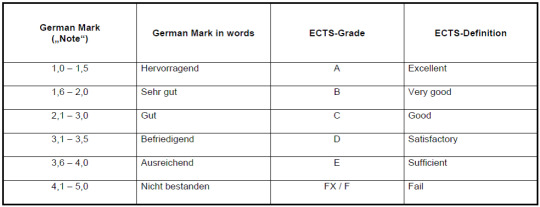
Levels
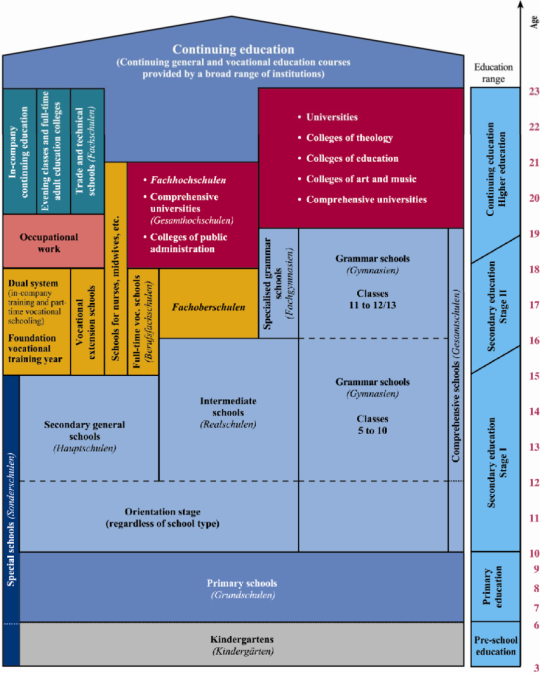
Preschool (Kindergarten)
Preschool education is neither mandatory nor free. Children between the ages of 2 and 6 attend Kindertagesstätte (Kita, “children’s daycare centers”). Many Kitas follow a certain educational approach, such as Montessori or Reggio Emilia.
Primary education (Primarstufe)
Primary education takes place in Grundschulen and generally lasts four years, from 6 to 10 years old. In Berlin and Brandenburg, it lasts six years.
Students are typically taught art, a foreign language (English or French), general studies (natural and social science), German, math, music, physical education, and religion or ethics.
Secondary education (Sekundarstufe)
Secondary education can take place in any of the following schools:
Gymnasium (grammar school) until grade 12 or 13 (ages 10–11 to 17–18/18–19), with Abitur as exit exam to qualify for university
Realschule (intermediate school) until grade 10 (ages 10–11 to 15–16), with Realschulabschluss
Hauptschule (secondary general school) until grade 9 or 10 (ages 10–11 to 14–15/15–16), with Hauptschulabschluss
Gesamtschule (comprehensive school) until grade 10 or 12/13 (ages 10–11 to 15–16 or 17–18/18–19)
The Gymnasium provides in-depth general education for university studies. Hauptschulen teach basic general education leading to vocational school or university entrance qualification. Realschule offers more extensive education than Hauptschule, leading to a vocational or university entrance qualification. A Gesamtschule combines all the aforementioned schools.
There are about twelve compulsory subjects in every grade: biology, chemistry, civics/social/political studies, up to three foreign languages, geography, German, history, math, music, physical education, physics, religion/ethics, and visual arts.
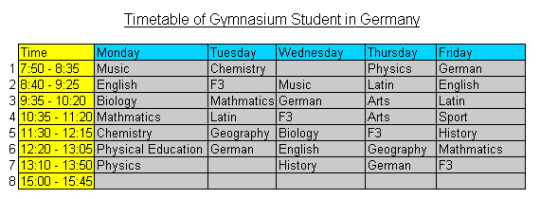
(F3 means Fremdsprache 3 [third foreign language], which is usually French or Spanish)
In grades 11–12/13, each student majors in two or three subjects (Leistungskurse), in which there are usually five lessons per week. The other subjects (Grundkurse) are usually taught three times a week.
Vocational training (Berufsbildung)
Vocational training lasts between two and three and a half years and can take place in any of the following types of school:
Berufsschule (vocational school): the standard type of vocational school, it prepares students for further vocational education or for a job in a profession. Apprentices attend school twice a week and spend the rest of the week working at a company, so they gain knowledge of theory and practice.
Berufsfachschule: similar to Berufsschule, it is aimed at people who want to study specific subjects, such as nursing or occupational therapy.
Fachoberschule (vocational high school): students who have obtained a Realschulabschluss or Hauptschulabschluss can attend a Fachoberschule, where they will specialize themselves in technology, economy, or administration and management, among other subjects. After completing the program, they can study for a university degree after passing the Abitur.
Berufsoberschule (upper vocational school): those who want to attend one need to have graduated from a Berufsschule. It provides in-depth education and training.
Higher education (Tertiärbereich)
To attend university, students need to pass the Abitur exams, of which at least one is oral. They are tested on four or five subjects, including their two or three Leistungskurse and two or three Grundkurse (German, math, and the first foreign language). All knowledge areas must be covered, including language, literature and the arts; social sciences; math, natural sciences and technology, and sports. Each semester of a subject studied in the final two years of Gymnasium yields up to fifteen points, where advanced courses may count double and final examinations count quadruple.
There are 380 universities in Germany, of which 114 are private. Public universities charge fees of around €150–350 per semester, which often include the cost of public transportation. Tertiary education institutions are classified into Universität or Hochschule. The former term is reserved for those which have the right to confer doctorates, in a similar distinction to universities and colleges in the United States. Fachhochschulen (Universities of Applied Sciences) are a type of Hochschule that concentrates on applied science and has a more practical profile with a focus on employability.
There are three types of admissions procedures for degree programs:
Free admissions: every applicant who fulfills the requirements is admitted. This is usually the case in programs in which many students quit, such as engineering, mathematics, or physics.
Local admission restrictions: only a limited number of places are available and students are admitting according to numerus clausus, whose criteria vary depending on the institution and the program but generally include the final grade of the Abitur, a weighted grade average that increases the weight of relevant school subjects, interviews, motivation letters, and/or letters of recommendation.
Nationwide admission restrictions: to study dentistry, medicine, pharmacy, or veterinary medicine, there is a nationwide numerus clausus in which applications are handled centrally for all universities.
There are three official university degrees: Bachelor (bachelor’s degree) takes three years to complete, Master (master’s degree) lasts two years, and Doktorat (doctoral degree or PhD) takes between two and five years.
Students can usually choose freely from all courses offered by the university, but all bachelor’s degree programs require a number of particular compulsory courses in the field of the study program.
62 notes
·
View notes
Text
Best Courses to Study in Australia for Indian Students with High ROI.

Why Australia is a Top Study Abroad Destination in 2025
Australia continues to rank among the top destinations for Indian students seeking world-class education, global career opportunities, and a multicultural lifestyle. With over 100,000 Indian students currently studying in Australia, the trend is fueled by high employability, quality institutions, and welcoming immigration policies. This blog provides a complete study guide in Australia for Indian students, focusing on the top courses offering the highest return on investment (ROI) in 2025.
Top Reasons to Study in Australia for Indian Students
Globally ranked universities like the University of Melbourne, ANU, and UNSW
Post-study work visas for up to 4 years
Pathways to Permanent Residency (PR)
Industry-relevant, skill-based courses
High graduate employability
Scholarships and financial support for Indian students
High ROI Courses for Indian Students in Australia
1. Information Technology and Computer Science
Why It’s Worth It:
Booming tech industry in cities like Sydney and Melbourne
Strong demand for software developers, AI specialists, and cybersecurity analysts
Excellent PR pathways via the Skilled Occupation List (SOL)
Career Opportunities:
Software Developer
Cloud Engineer
Cybersecurity Analyst
Average Salary: AUD 70,000 – 120,000
2. Engineering (Civil, Mechanical, Electrical, Mining)
Why It’s Worth It:
High demand for engineers in infrastructure, renewable energy, and mining
PR-friendly occupations
Hands-on, accredited programs (Engineers Australia recognition)
Career Paths:
Civil Engineer
Structural Engineer
Renewable Energy Consultant
Average Salary: AUD 75,000 – 130,000
3. Health Sciences & Nursing
Why It’s Worth It:
Acute shortage of skilled healthcare workers
Strong employment growth projected until 2030
Offers direct PR routes for nursing graduates
Career Opportunities:
Registered Nurse
Public Health Officer
Physiotherapist
Average Salary: AUD 65,000 – 110,000
4. Business Analytics and Data Science
Why It’s Worth It:
High demand across sectors (banking, retail, healthcare)
Versatile career paths with global appeal
STEM classification supports extended post-study work visa
Career Options:
Data Analyst
Business Intelligence Consultant
Data Scientist
Average Salary: AUD 85,000 – 130,000
5. Accounting and Finance
Why It’s Worth It:
Consistent job demand across Australia
Accredited courses (CPA Australia, CA ANZ)
Opens doors to roles in multinational firms
Career Opportunities:
Chartered Accountant
Financial Analyst
Auditor
Average Salary: AUD 70,000 – 115,000
6. Education and Teaching
Why It’s Worth It:
Australia’s school system seeks qualified teachers, especially in regional areas
Included in the Medium and Long-term Strategic Skills List (MLTSSL)
Roles After Graduation:
Primary School Teacher
Early Childhood Educator
Secondary School Teacher
Average Salary: AUD 65,000 – 100,000
7. Architecture and Construction Management
Why It’s Worth It:
Australia’s urban expansion and infrastructure projects
Recognized qualifications with global applicability
Popular Careers:
Architect
Project Manager
Construction Estimator
Average Salary: AUD 70,000 – 120,000
Cost of Education in Australia (2025)
Course Type
Average Annual Tuition (AUD)
UG Courses
20,000 – 45,000
PG Courses
22,000 – 50,000
MBA
40,000 – 80,000
Scholarships Available for Indian Students
Australia Awards Scholarships – Fully funded by the Australian government
Destination Australia Scholarships – Regional study scholarships worth AUD 15,000
University-Specific Grants – E.g., Monash International Merit Scholarship, University of Sydney International Scholarships
Post-Study Work Rights and PR Pathways
Australia allows international students to work up to 20 hours per week during semesters and full-time during breaks. Graduates can apply for a Temporary Graduate visa (subclass 485), offering work rights for 2–4 years depending on qualification and location.
PR Pathways via:
General Skilled Migration (GSM)
Employer-Sponsored Visas
Regional Migration Programs
How Eduvisor Can Help You Study in Australia
Navigating the Australian education system, choosing the right course, and applying for visas can be overwhelming. That’s where Eduvisor, a trusted study abroad consultant in India, steps in. Eduvisor offers personalized counseling, university shortlisting, scholarship assistance, SOP writing, and complete visa support — tailored for Indian students planning to study in Australia.
Final Thoughts
Choosing a high-ROI course in Australia is more than just picking a subject — it’s about aligning your passion with global trends. With the right guidance and planning, Australia can be your gateway to a successful international career. Use this study guide in Australia for Indian students as your blueprint for 2025 and beyond.
Ready to begin your journey? Let Eduvisor turn your study abroad dream into reality.
FAQs
Q1. What are the most affordable courses to study in Australia? A: Vocational Education & Training (VET) courses, TAFE programs, and regional university degrees are often more budget-friendly.
Q2. Is PR easy after studying in Australia? A: Courses on the SOL and MLTSSL lists (like IT, Nursing, Engineering) make it easier to qualify for PR.
Q3. How do I find scholarships to study in Australia? A: Government sites, university portals, and expert consultants like Eduvisor can help you explore scholarships based on merit, need, and region.
2 notes
·
View notes
Text
Best Primary Science Tuition in Singapore | Learniverse.edu.sg
Unlock your child's potential with the best primary science tuition in Singapore. Our expert tutors offer interactive and stimulating lessons that make complex scientific concepts easy to grasp. We use a hands-on approach to foster a love for science and enhance critical thinking skills. Explore our science tuition programs and see how we can support your child's academic growth at Learniverse.
Best Primary Science Tuition in Singapore

0 notes
Note
forward rolls into your inbox :3
good evening.....morning.....teehee....(i am assuming you are seeing this at 9am, which in case....hope you are enjoying your breakfast! and also. wow, that is a healthy sleep schedule for an SG student newly lavishing in the freedom of the holidays.) im rewlly happy you dont mind me rolling into your inbox every day. i love doing it. seriously. like you said, it feels like using Singpost and writing letters. its part of why i love tumblr and its askboxes.
saying that youre struggling with MOE past year papers/different school papers is so damn relatable. i'm just grateful im not in pri sch anymore where teachers woukd be dispensing that shit like water at the water cooler. LMAO
youre a kazuha liker huh? my friend is too. so as a birthday present, i drew kazuha with weed on the class whiteboard once for their birthday. i knew next to nothing about his lore but their expression of utter despair was worth it.
YOU MADE YOUR PLD LOCKSCREEN TALKINGMIME?!?!?!?!? thats kinda genius too. i woukd scream and panic if i saw this in public btw. and flounder in panic and joy like a pathetic fish. blub
Im still pretty new to mcsr in general, but i actually followed an unusual pipeline into it: unlike most people being introduced via couri or feinberg, i actually entered via 21mustard.... more specufically the vid about his online friend trying to find him again. i like 21mustard and zylenox :3 and emerald (ithink), fein, mr lewis fulham, poundcake, fyroah and ofc mr mime. im still exploring though. im charmed by k4's mic peaks. it took me ages to strart putting names to faces and then voices...
as for my own speedrunning, i unfortunately do not play any noteworthy speedrunning games. however, i am currently trying to speedrun Minesweeper! its going pretty well.
as always, i hope youre doing well, whenever youre reading this. - sgmcsr anon
GOOD MORNING.. I'm replying to this a little too late (it's 12pm), but IDGAF LETS ROLL!!
I love opening inbox and answering asks, it's like. you get a silly letter every single day to answer and. i get why the people in the past really fucked w this... it's really awesome. anyway.
about MOE and exams, ohh thank god I'm not in primary school anymore, that PSLE grind was HORRIBLE. having to do like. what, 20 page papers for math (paper 1 or 2 alone!!) and all of them being really difficult questions really fucked w my brain... at least papers now are semi tolerable and I can do them 🤷 I remember in primary school my science teacher handed us like.. 5 past year papers to do over June holidays, and I was COOKED. anyway
about genshin, LMAOOOO FUCK THATS HILARIOUS... I'd be terrified too if I saw kazuha smoking a blunt for my birthday like. the aura that exudes. holy schmoly
about talkingmime, YEAH.. my PLD lock screen is actually that one silly art piece of everyone who played pico park, and on my home screen is a small talkingmime doodle... I am normal, totally! I must be normal! fun fact, my phone lock screen is silverrruns. Hehe. this photo specifically
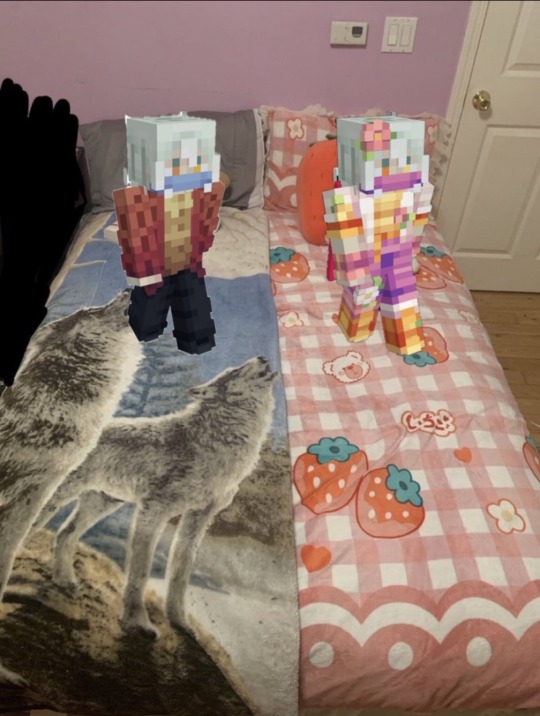
yeah. Hehe. and my home screen is a really pretty nEmerald drawing... :3
about speedrunners THOSE ARE A BUNCHA GOOD PICKS... k4's mic peaks are legendary.. yay. NEMERALD AND FYROAH.. ohh. I love them very muchie. I even drew them. they're so skibidi to me.
about speedrunning, minesweeper speedrunning is verg cool. I've always wanted to learn how to play minesweeper... but it's always so scarrryyy... I should learn how to play it one day, on skibidi..
IM FINISHING THIS AT 1 34 PM. IM STUCK IN MATH TUITION RN. I love your singposts , thank u sg anon have a skibidi day
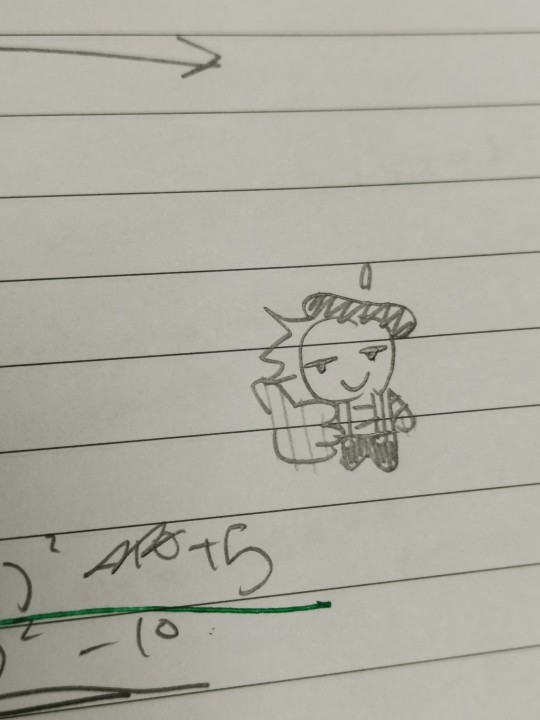
1 note
·
View note
Text
https://singapore88tuition.blogspot.com/2023/07/unlocking-academic-success-secondary-1.html
#secondary science tuition singapore#primary school tuition#online tuition singapore#secondary school tuition
0 notes
Text
Humanist is not a term that could be applied to Milei’s economics. Apart from legalising the sale of body organs, his spiky agenda proposes “dynamiting” the Central Bank, abolishing Argentina’s tuition-free public education system and disbanding free public health services. Milei is also treading fearlessly into anti-woke territory saying he will reinstate the ban on abortion, legalised in 2020, shut down the ministry of women, gender and diversity, as well as the ministries of science – “climate change is a socialist lie” – health, education, labour and public works, and will legalise the sale of firearms. Despite this heady mix, Milei is broadly considered the undisputed shoo-in president appealing particularly to young underprivileged men.
Uki Goñi in The Guardian. The ‘false prophet’ v the pope: Argentina faces clash of ideologies in election
Javier Milei, a culture war populist and sex coach who won country’s open primary, rages at ‘communist’ pontiff as he sets his sights on becoming president
2 notes
·
View notes
Text
The Conveniences and Difficulties of Homeschooling: A Comprehensive Overview
Intro to Homeschooling and its Benefits
Homeschooling, a method that includes moms and dads or guardians informing their youngsters in the house instead of sending them to standard colleges, has acquired substantial focus in recent times. This alternative type of education supplies various advantages that attract families seeking versatility, individualized knowing, and a customized curriculum. One of the primary benefits of homeschooling is the capability to develop a tailored educational experience that matches the distinct requirements and discovering styles of each kid. Unlike typical education, homeschooling permits moms and dads to adapt teaching approaches, speed, and content according to their youngster's specific strengths and weak points. This personalized method typically causes much better academic performance, boosted confidence, and a love for learning.Additionally, homeschooling makes it possible for households to have higher versatility in organizing. Without the rigid framework of traditional college hours, households can create their own routines and fit various activities, such as school outing, extracurriculars, or family holidays. This versatility allows children to discover their rate of interests beyond academics, fostering a versatile education and learning and boosting their general advancement. In addition, homeschooling gives a safe and nurturing environment, cost-free from the distractions and negative influences frequently located in typical institutions. This atmosphere enables for a much deeper parent-child bond, motivating open communication and cultivating a favorable learning atmosphere.The Obstacles and Considerations of Homeschooling While homeschooling supplies countless benefits, it is necessary
to recognize the difficulties and factors to consider related to this educational option. One considerable challenge is the potential isolation of kids from their peers. Conventional institutions provide children with day-to-day interactions and social possibilities that add to their social development. To overcome this difficulty, homeschooling family members frequently get involved in co-ops, regional homeschool groups, or neighborhood tasks to guarantee their youngsters have routine social interactions.Another consideration is the dedication needed from moms and dads or guardians that take on the responsibility of enlightening their youngsters. Homeschooling needs considerable time and initiative in intending lessons, sourcing materials, and providing advice throughout the knowing procedure. It is crucial for moms and dads to evaluate their ability to dedicate the required energy and time to homeschooling their children effectively.Moreover, homeschooling might present obstacles for households with working moms and dads or single-parent households. Balancing job responsibilities with homeschooling can be requiring, and different arrangements might need to be checked out to make sure
a successful homeschooling experience.In final thought, homeschooling supplies a variety of advantages, including customized education and learning, flexibility, and a
Read more here combined science tuition
1 note
·
View note
Text
This day in history
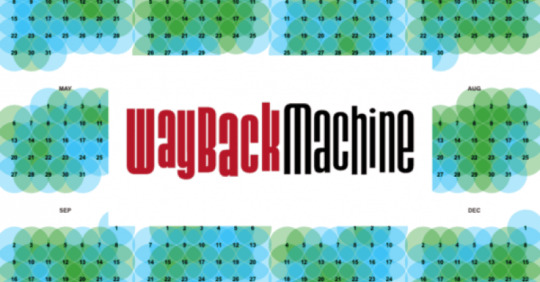
Tomorrow (July 18), I’m hosting the first Clarion Summer Write-In Series, an hour-long, free drop-in group writing and discussion session. It’s in support of the Clarion SF/F writing workshop’s fundraiser to offer tuition support to students:
https://mailchi.mp/theclarionfoundation/clarion-write-ins

#20yrsago How the Nerds Were Having A Perfectly Good Time Until The Businesspeople And Lawyers Showed Up And Ruined Everything http://www.onlisareinsradar.com/archives/001529.php#001529
#10yrsago Toronto’s Honest Ed’s will go https://www.thestar.com/news/gta/2013/07/16/honest_eds_is_up_for_sale.html
#5yrsago Hackers say they stole tens of thousands of health records of Ontario home-care patients and they want to get paid https://www.cbc.ca/news/science/carepartners-data-breach-ransom-patients-medical-records-1.4749515
#5yrsago Leading voting machine company admits it lied, reveals that its voting machines ship backdoored, with pre-installed remote access software https://www.vice.com/en/article/mb4ezy/top-voting-machine-vendor-admits-it-installed-remote-access-software-on-systems-sold-to-states
#5yrsago UK railway arches, the last bastion of publicly owned commercial space, engines of small business, about to be killed by privatization https://theconversation.com/britains-railway-arches-are-being-sold-off-and-small-businesses-could-be-forced-out-99907
#5yrsago They said Alexandria Ocasio-Cortez’s message wouldn’t play in the midwest, now she and Bernie are headed to Kansas https://theintercept.com/2018/07/17/brent-welder-kansas-primary-3rd-district-ocasio-cortez-bernie-sanders/
3 notes
·
View notes